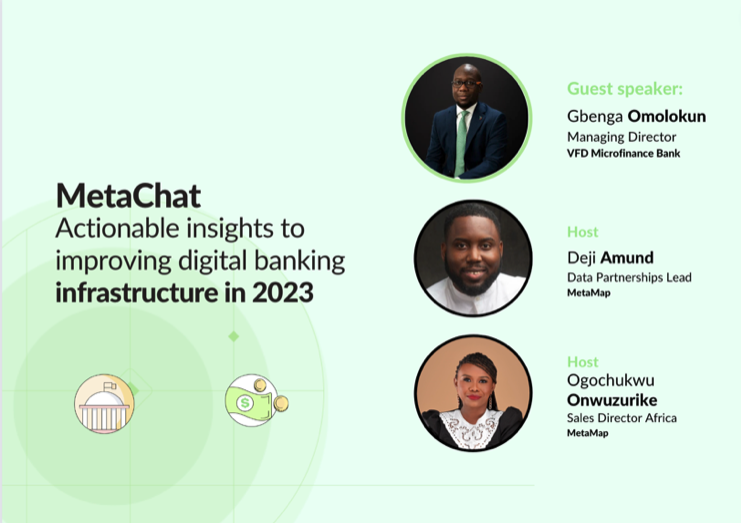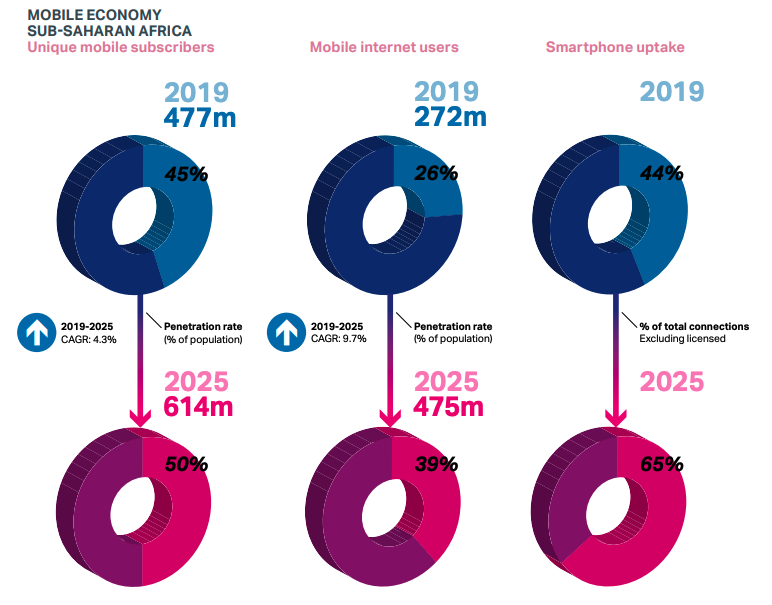Contents
With this in mind, Gbenga Omolukun, Managing Director of VFD Microfinance Bank, Deji Amund, Data Partnerships Lead, and Ogo Onwuzurike, Sales Director of Africa from MetaMap, explored some of the key ways in which Africa can improve its digital banking infrastructure in the coming year and how this can help drive economic growth and development across the entire continent, in our first Africa MetaChat called “Actionable insights to improving digital.”

How is the shape of Digital Banking in Africa?
It is almost impossible to compare the African continent as one with other regions or continents of the world. Since we are talking about one of the world’s largest continents in size and population.
Also, according to National Geographic experts, this immense territory comprises 54 countries, +1500 dialects and languages, and an infinity of different cultures. It is well known for its stark contrasts on social, economic, political, institutional, and technological issues.
That is why an internal POV is necessary to understand the African continent’s reality. In this case, the point of view comes from Gbenga Omolukun, Managing Director of VFD Microfinance Bank, and Ogochukwu Onwuzurike, MetaMap’s Sales Director of Africa, and Deji Amund, Data Partnership Lead, from the MetaMap team.
“Normally, when people compare Africa with the western regions, they tend to say that digital banking in our region is fast growing. Although it is, the reality is that because it is a nascent industry vs. in the west where the industry has already reached a level of maturity, it is stable in its growth”, said Gbenga Omolukun.
According to Forbes, digital banking uses electronic channels, such as the internet and mobile apps, to access banking services and conduct financial transactions. It allows customers to manage their accounts, make payments, and more without the need to visit a physical bank branch.
However, the VFD Bank M.D. considers that certain services are reaching a much higher level of maturity than other regions of the world do not have, such as instant payments between people.
Let’s add up some data.
To get an idea of the magnitude of the tech industry in Africa, let’s put some numbers on the table.
According to the Partechpartners report, 2021 AFRICA TECH VENTURE CAPITAL, African tech, digital banking, and fintech industry, grew faster than any other region, with 2x the activity of last year and more than 3x the amount invested.
“First, 2021 was a recovery year; after covid slowed investment in 2020, especially in the larger ticket category, accelerated activity was to be expected. Then, a rising tide is driving 2x growth in VC worldwide, not just in Africa. Finally, it’s still a small market, growing fast in multiples, yes, but absolute numbers are still relatively low”. Says the Partechpartners report.
With this aggressive growth of the technology industry and along with the economic and population growth of Africa, we might think that they already have everything figured out on this continent.
But, we have not yet talked about the issues of internet connectivity, which is vital to be able to access the new tools that are currently available.
In the same way, one of the biggest obstacles to the growth of digital banking in Africa is the lack of reliable and affordable internet connectivity.
In many parts of the continent, internet access is still limited or non-existent, which, according to the last Microsoft reports, makes it difficult for people to use digital banking services. But this reality is changing as we speak.

According to this report, the democratization of the internet, mobile phones, and a host of other technologies could accelerate further in the coming years. Making more and more Africans have access to tools, in turn, would allow them to access digital banking.
Nonetheless, for Gbenga Omolukun, Managing Director of VFD Microfinance Bank, the issue of the trust of financial institutions towards end users is a problem that continues to generate friction points for the industry, regardless of how much improvement in connectivity or economic growth we are talking about. Both in Africa in general and throughout the world.
The issue of trust
Another key issue is the lack of financial literacy among many Africans. Many people need to become more familiar with the basics of digital banking. They may be hesitant to use these services for fear of losing their money or being scammed, according to Gbenga Omolukun.
To address this problem, African banks and other financial institutions need to invest in education and training programs that can help people understand the benefits of digital banking and how to use these services safely and securely.
For Gbenga Omolukun, the issue of trust is a significant friction point in Africa, “we are a society that does not trust each other.” Therefore, digital banking and Fintech need help to migrate the population from cash to digital banking through tools that increase trust between parties.
But, for this, it is also necessary to use technologies that can both solve the issues of lack of trust and be as instantaneous as the cash payments themselves.
“Every problem is an opportunity. If you have a large population with trust issues, it’s the perfect opportunity to build something different. Let’s take Nigeria as an example. In 2009, you couldn’t pay with a debit card in many retail stores because the owners did not trust a tool in which their money was available the next day and were also charged with a small commission. While cash was available instantly and without commission”, said Gbenga Omolukun.
For Gbenga Omolukun., it is surprising that nowadays, even the population living in the most remote villages uses technological platforms for payments.
“And now, something that was so distant and strange to them has become part of their daily lives; many are making deposits, requesting loans, transferring money, and paying for goods and services. Everything, when the issue of trust was resolved”, expressed the VFD MicroFinance Bank MD.
For him, as Africa’s population migrates to the financial world, they will add their statistics to the continent’s real economic growth.
Their problems will now be measurable; they will contribute taxes to the states to improve essential services, and they will be able to access better jobs and better opportunities.
The issue of technology
As we mentioned at the beginning, the issue of democratizing access to achieve better opportunities in Africa can not only be dealt with solely from the perspective of trust.
But also from the issue of access to technology, as an amalgamation of society, by millions of people throughout the African continent.
For Gbenga Omolukun, the cost reduction of technologies in the last five years has meant that access to them is no longer an entry barrier for financial institutions to offer products focused on financial inclusion for a large part of the population that does not have the resources or the necessary history to access traditional financial services.
And therefore, it has opened the door to more and better financial services for most.
This reality has also opened the door to the Fintech industry and its new ways of seeing the traditional financial world. They focus on access to financial services built by and for those who were once excluded from the traditional world by the same lack of trust.
“With the arrival and strengthening of Fintech in the African market has forced traditional banks to rethink their processes. Since now, these “small” players can do the same things as them, but much faster, with more flexibility,” explained Gbenga Omolukun.
Finally, African banks need to invest in developing innovative and user-friendly digital banking products and services. This includes mobile banking apps, online payment systems, and other tools that can make it easier and more convenient for people to manage their money digitally.
By offering these kinds of services, African banks can attract more customers and build a strong foundation for the growth of digital banking in the region.
Technology and trust are coming together.
Let’s talk about risk or lack of trust.
Currently, to meet the market’s needs inside and outside Africa, technologies have evolved not only to break down the barriers of entry to companies but also to solve the issue of lack of trust (high risk) with technological tools.
The more trust financial institutions can have in their users, the more opportunities and better services the clients can receive. It is a two-way street.
It is in the hands of technology to increase trust by reducing the costs of verification and validation of identities and merits of the African population.
“Features like unlocking our mobile phones with Biometric technology are already common. And now traditional banks can access more customers with this technology by proving that they really are who they say they are”, said Gbenga Omolukun.
It is essential to point out that being able to fight money laundering and bad actors and be compliant at the enterprise level while offering users digital onboarding from the comfort of their homes is now achievable and quite popular in Africa. It’s all thanks to technology, according to Ogochukwu Onwuzurike, Sales Director Africa at MetaMap.
In conclusion, the growth of digital banking in Africa is critical for the continent’s economic development. By investing in infrastructure, education, and innovation, African governments and businesses can help to build a solid and resilient digital banking sector that can support the needs of its people and businesses.
On our first MetaChat hosted by our team in Africa, we discussed of two fundamental problems of the African continent, which can also be observed in all parts of the world. But we have mentioned the intersection between technology and trust as the key to accessing greater opportunities.
MetaMap’s mission is to connect “unverified” users digitally with companies from all sectors in an almost immediate, safe, regulated, affordable and simple way, both for companies and users.
With the intention of, on the one hand, reducing the risks that banking institutions present by increasing trust in their end users. And on the other, an easy-to-use tool to map people’s merits in a matter of minutes.
With these two sides of the same coin, users can access better services, while companies can open their doors to more and more users.
And just like this, MetaMap can easily and reliably help companies validate the identity of users.
If you want to know more, our expert team is waiting for your call. Contact us today and schedule a free demo!
Related content
Subscribe to the newsletter and stay up to date with promotions, special offers and news


